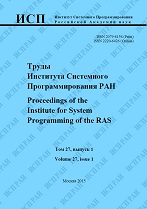|
Automated type contracts generation in Ruby
N. Y. Viuginovab, V. S. Fondaratovb
a St. Petersburg State University
b JetBrains
Abstract:
Elegant syntax of the Ruby language pays back when it comes to finding bugs in large codebases. Static analysis is hindered by specific capabilities of Ruby, such as defining methods dynamically and evaluating string expressions. Even in dynamically typed languages, type information is very useful as it ensures better type safety and more reliable checking whether the called method is defined for the object or whether the arguments of the correct types are passed to it. One may annotate the code with YARD (Ruby documentation tool) to declare the input and output types of methods or even declare methods that are added dynamically. These annotations improve the capabilities of tooling such as code completion. This paper reports a new approach to type annotations generation. We trace direct method calls while the program is running, evaluate types of input and output variables and use this information to derive implicit type contracts. Each method or function is associated with a finite-state automaton consisting of all variants of typed signatures for this method. An effective compression technique is applied to the automaton to reduce the cost of storage and allows to display the collected information in a human-readable form. The exhaustiveness of the contract defined by the generated automaton depends on the diversity of the traced method usages. Therefore, it is also important to be able to merge all the automatons received from users into one, which is further covered in this paper.
Keywords:
Ruby, dynamically typed languages, Ruby VM, YARV, method signature, type inference, static code analysis.
Citation:
N. Y. Viuginov, V. S. Fondaratov, “Automated type contracts generation in Ruby”, Proceedings of ISP RAS, 29:4 (2017), 7–20
Linking options:
https://www.mathnet.ru/eng/tisp232 https://www.mathnet.ru/eng/tisp/v29/i4/p7
|

| Statistics & downloads: |
| Abstract page: | 140 | | Full-text PDF : | 59 | | References: | 23 |
|




 Contact us:
Contact us: Terms of Use
Terms of Use
 Registration to the website
Registration to the website Logotypes
Logotypes







 Citation in format
Citation in format 